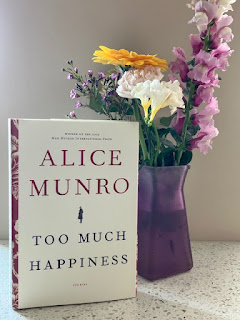Ordinary Lives
On Monday this week, I listened to BOOKSPO, KerryClare’s podcast, where the author being interviewed spoke of Alice Munro as the inspiration for her book. And then, Alice Munro died. Quite serendipitous, in a strange way, I would say.
To honour Munro, I pulled out one of her books and read a short story, in fact one of the ones, Dimensions, mentioned in the podcast.
Munro writes about ordinary women with extraordinary complexity.
In one interview, Alice Munro said she didn’t think anyone was, in fact,
ordinary.
The older generation is often encouraged to write down their
stories, pass them along. And that may have been true of the silent generation,
who lived through wars and hardship, rationing and scarcity. But is anyone now,
apart from family and a few friends, interested in the stories of the ordinary
lives of my generation, the Boomers?
My life was (and is) ordinary. Perhaps even Alice Munro would not have been interested. Who would care that I grew up in a two-bedroom apartment on the second floor of a building in Bahrain? That we played hopscotch and seven tiles and dug in the dirt while our parents napped?
That we
had a freedom and innocence in our childhood that is forever gone. That, at
sixteen, I purchased my first car, a beat-up, brown, stick-shift Toyota Corolla
hatchback which was the first car in our family. My parents had never owned a
car, and my dad was so proud that I passed my driving test and was able to
purchase one. I can’t remember if he gave me any money towards it (I had
saved my own), but I do remember the smile on his face when I showed it to him.
Before I got my car, we walked pretty much everywhere, to church, to the suq,
to friends’ houses. In blazing heat, we walked, no hats, no sunscreen, no toting
along the ever-present water bottle you see everywhere now. But after I got my
car, I would sometimes drive my mother to church. My father still preferred
mostly to walk (not to church; he never went).
Do these ordinary moments in ordinary lives matter? That we had one rotary black telephone that served all six apartments in the building and sat on the landing between the ground and second floor. That the first family to get a television was the one who lived on the ground floor with ten kids, and we would go there to watch Bonanza every week, all of us girls a little bit in love with Little Joe.
Eventually, our family got its own black-and-white television, and we could watch Ironside and Perry Mason and The Ed Sullivan Show, often frustrated when shows were interrupted by that old test pattern ( Indian-head testpattern - Wikipedia) that featured a Native American in headdress, a pattern we never understood. Does anyone want to know these things?
Ordinary, everyday moments make a life appear uninteresting and commonplace on the outside. And that may be true. But it is our interior lives and relationships, our thoughts and musings, that add complexity and depth. And maybe that’s what Munro meant when she said: “I never meet anyone I do consider ordinary”.




I don’t think your life sounds ordinary at all! And I love to read of your wandering and adventures. Kim
ReplyDeleteI think your life is far from ordinary Pearl. Your childhood stories are interesting and poignant. You have raised a child, had a challenging job, are an excellent writer and your art work is stunning. Your solitary travels are a challenge to any woman who wonders about traveling alone and the places you see, your comments, your art from your travels are very inspiring. I would say you have an exceptional life.
ReplyDelete